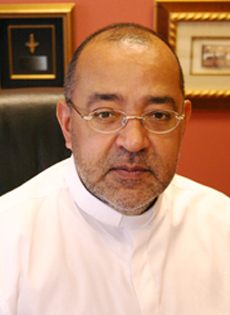
Why Does the Church Need Deacons?
Monday, September 7, 2009
*Deacon Victor Pimentel
On the morning of Aug. 29, the Memorial of the Martyrdom of John the Baptist, Archbishop John C. Favalora accepted into candidacy 30 men who are continuing the process of discerning a possible calling to ordained ministry as a deacon (Click here to read diaconate ceremony article). Joyful moments such as these make me reflect on the aspirants who enter diaconate formation. The Rite of Admission to Candidacy celebrates a measure of achievement: Having undergone an initial period of preliminary instruction, the aspirants become candidates and a gradual transformation begins to take place leading towards ordination in due time. Why would these men subject themselves to such a long, spiritually and academically rigorous process?
Following the Lord is both an invitation and a challenge. The deacon formation program is very challenging. It is designed to deepen the spiritual sense of the individual while preparing the candidate to be a public minister in the Church. Over a period of four years the candidate develops further the human, intellectual, spiritual, liturgical and pastoral aspects of his ministry. The program demands a great deal of academic work, a continuous vocational discernment, the development of ministerial skills, and a deepening spiritual and devotional life. All these while maintaining his primary responsibilities for family life and work.
Diaconate formation is not simply a program that one completes in order to be ordained a deacon; it is a spiritually rigorous process of discerning the vocation to which the Lord is calling these men. As a result, such moments draw me, as their director, into a deeper reflection over the importance of their formation and future ministry. At the same time, I am asked to answer the question, why are deacons necessary to the Church?
In order to fully understand the necessity for the diaconate, we must first understand who deacons are and what we do.
According to “The Directory for Formation, Ministry and Life of Permanent Deacons,” issued jointly by the Congregation for Catholic Education and the Congregation for the Clergy, the deacon is “a sacred minister and member of the hierarchy.” He is ordained to the first rank of sacred orders, not to the priesthood or the episcopacy. He is no longer a layman, but a member of the clergy. Like other clerics, the deacon participates in the threefold ministry of Jesus Christ: the “diaconia of the liturgy, the word, and of charity.” He represents “Christ the Servant” in his unique clerical vocation.
The deacon teaches the Word of God, administers baptism solemnly and helps lead the community in its religious life. He assists at the altar, proclaims the Gospel and preaches and distributes the Eucharist as an ordinary minister. He blesses marriages, presides over funerals, administers viaticum to the sick and dying, can preside over exposition and benediction of the Blessed Sacrament, administers sacramentals and leads Sunday celebrations in the absence of a priest.
Most significantly, because deacons receive the Sacrament of Holy Orders, they are sent by Christ to serve God’s people. Deacons are called to do so out of the depths of an interior life centered in the Eucharist, and fueled by a life of prayer.
Deacons are important for the Church because the Church’s mission is not a single act but a process: to preach the Gospel, to proclaim the kerygma, to deepen faith and the sacramental life, to bring Christ to those who do not know Him. That is what the deacon is ordained to do. The definition of a deacon is misunderstood if it is defined by what he does. The deacon is the sacramental presence of Christ as one who serves. He is at the center of the Church’s mission to evangelize. The deacon is called not only to do things but to have a life of prayer, which is his foundation. He must seek holiness before he can preach to others. God asks more of us because He is offering more. The modern world listens to witnesses and the deacon is a witness of the Gospel, whose herald he becomes at ordination. The specific role of a deacon is to draw the Church into humble service, into Christ’s washing of feet, into his humble ministry of charity.
Our mission is the diakonia, which means service. It is a calling. By virtue of baptism, all Christians are called by God to be witnesses to the faith and to serve others. Service in charity and truth should be a natural consequence of spiritual growth and maturity.
How do you think God is calling you to serve the Church? May our Lord grant you the graces to find and fulfill His will for your life.
Deacon Victor Pimentel
Executive Director, Office for the Diaconate


Comments from readers
Camilo, thanks for sharing your desire to further discern this ministry of service. Feel free to contact me at the diaconate office, I will be happy to answer your questions and inform you of the process for consideration to aspirancy.
Please pray for us.
God Bless You!!
of the Lord; the calling, the love, faith, and selfless service, that an ordained Deacon represent to the Church community.
Deacon Victor